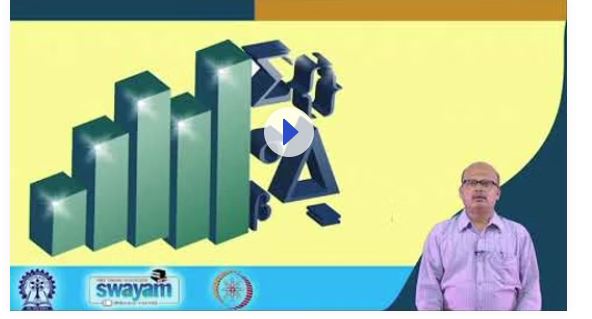Statistical Inference IIT KGP free videos and free material uploaded by Indian Institute of Technology, Kharagpur (IIT Kharagpur). This session contains about Statistical Inference IIT KGP Updated syllabus , Lecture notes , videos , MCQ , Privious Question papers and Toppers Training Provided Training of this course. If Material not uploaded check another subject
Week 1 :1. Introduction and Motivation – I2. Introduction and Motivation – II3. Basic Concepts of Point Estimations – III4. Basic Concepts of Point Estimations – IV5. Basic Concepts of Point Estimations – V
Week 2 :6 .Basic Concepts of Point Estimations – VI7. Finding Estimators – I8. Finding Estimators – II9. Finding Estimators – III10.Finding Estimators – IV
Week 3 :11.Finding Estimators – V12.Finding Estimators – VI13.Properties of MLEs – I14.Properties of MLEs – II15.Lower Bounds for Variance – I
Week 4 :16.Lower Bounds for Variance – II17.Lower Bounds of Variance – III18.Lower Bounds of Variance – IV19.Lower Bounds of Variance – V20.Lower Bounds of Variance – VI
Week 5 :21.Lower Bounds of Variance – VII22.Lower Bounds of Variance – VIII23.Sufficiency – I24.Sufficiency – II25.Sufficiency and Information – I
Week 6 :26.Sufficiency and Information – II27.Minimal Sufficiency, Completeness – I28.Minimal Sufficiency, Completeness – II29.UMVU Estimation, Ancillarity – I30.UMVU Estimation, Ancillarity – II
Week 7 :31.Testing of Hypotheses: Basic Concepts – I32.Testing of Hypotheses: Basic Concepts - II33.Neyman Pearson Fundamental Lemma – I34.Neyman Pearson Fundamental Lemma – II35.Application of NP Lemma – I
Week 8 :36. Application of NP Lemma – II UMP Unbiased Tests – II37. UMP Tests – I38.UMP Tests – II39.UMP Tests – III40.UMP Tests – IV
Week 9 :41.UMP Unbiased Tests – I42.UMP Unbiased Tests – II43.UMP Unbiased Tests – III44.UMP Unbiased Tests – IV45.Applications of UMP Unbiased Tests – I46.Applications of UMP Unbiased Tests – II
Week 10 :47.Unbiased Tests for Normal Populations – I48.Unbiased Tests for Normal Populations – II49.Unbiased Tests for Normal Populations – III50.Unbiased Tests for Normal Populations - IV51.Likelihood Ratio Tests – I52.Likelihood Ratio Tests – IIV
Week 11 :53.Likelihood Ratio Tests – III54.Likelihood Ratio Tests – IV55.Likelihood Ratio Tests – V56.Likelihood Ratio Tests – VI57.Likelihood Ratio Tests – VII58.Likelihood Ratio Tests – VIII
Week 12 :59.Test for Goodness of Fit – I60.Test for Goodness of Fit – II61.Interval estimation – I62.Interval estimation – II63.Interval estimation – III64.Interval estimation – IV
Sir R.A. Fisher published two seminal papers on the foundations of statistical inference in 1922 and 1925. These and subsequent publication of his book “Statistical Methods for Research Workers” led to a revolutionary use of statistical ideas in all branches of science, engineering, medical, biology and social sciences. Shortly afterwards the testing of hypothesis was given a firm theoretical foundation by J. Neyman and E.S. person in a series of papers. In the last ninety years the two topics of estimation and testing of hypothesis have become inseparable part of any scientific investigation. As the scientists in various areas need to use these methods, the students need to learn the basics of the theory behind these. The present course has been designed to introduce the subject to undergraduate/postgraduate students in science and engineering. The course contains a good introduction to each topic and an advance treatment of theory at a fairly understandable level to the students at this stage. Each concept has been explained through examples and problems.INTENDED AUDIENCE:Students studying Major in Statistics, Mathematics, all engineering disciplines aspiring for a career in data science and data analytics. The students of Computer Science and Engg, Electronics and Communications, Electrical, Industrial, Mechanical, Chemical, Economics, Biotechnology, Mining, Agriculture and Food Technology etc. can take this coursePREREQUISITES: Students must have done a basic course in Probability, Distributions and Statistics. They must have good knowledge of differential and integral calculus, sequences and series, basic linear/matrix Algebra (usually students who have completed Mathematics-I and II at first year undergraduate level)INDUSTRY SUPPORT: All companies which deal with data/business analytics will recognize this course. Today all industries use statistical methods. So for students desirous to work in any type of industry, this course will be indispensable. In particular, companies dealing with Business Analytics, Banking and finance, Insurance, machine learning, data mining etc. this course will be invaluable.

- 0 Reviews
- 8 Students
- 351 Courses

Write a public review